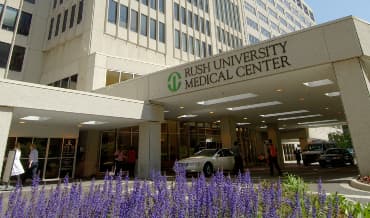Amyloidosis is a rare organ debilitating disease that causes organs and tissues, including the heart, kidneys, skin, stomach, large and small intestines, nerves and liver to thicken and eventually lose function.
It occurs when a person's antibody-producing cells do not function properly and produce abnormal protein clumps, called amyloid deposits, that damage the affected area.
With early diagnosis and treatment, Rush experts can help you manage this disease.
Signs You Should Get Help for Amyloidosis
Amyloidosis symptoms depend on which area of your body is affected. Symptoms may include the following:
- Difficulty breathing (dyspnea)
- Low exercise tolerance
- Arrhythmias
- Hypotension
- Fatigue
- Irregular heartbeat
- Skin changes, such as easy bruising
- Swelling of the arms, legs and tongue
- Weight loss
See your primary care provider if you experience any of these symptoms. If your doctor suspects you have amyloidosis, they may refer you to an amyloidosis specialist
Your prognosis and treatment depend on which areas of your body are affected. Organ failure may result if your heart or kidney is damaged.
Amyloidosis Treatment at Rush
There are three types of amyloidosis:
- Primary amyloidosis: This is the most common form and has no known causes. It can lead to several conditions, including carpal tunnel syndrome, congestive heart failure and kidney failure.
- Secondary amyloidosis: This occurs due to the presence of another disease, particularly chronic infections or inflammatory diseases such as cystic fibrosis, Hodgkin lymphoma, multiple myeloma and tuberculosis.
- Familial amyloidosis: This is passed on within families through genes, often affecting the central nervous system and kidneys.
If you are diagnosed with amyloidosis, your care team may include a variety of experts, such as specialists in hematology, nephrology, neurology and cardiology.
Treatment will focus on destroying abnormal cells in the blood and may include the following:
- Chemotherapy
- Bone marrow transplant
- Targeted therapies
- Dialysis
- Heart or kidney transplant
If another disease caused amyloidosis, we will treat that condition aggressively to try to slow the progression of amyloidosis.
Rush Excellence in Amyloidosis Care
- Nationally ranked experts focused on you: Rush is ranked among the best in the country by U.S. News & World Report for many of the programs that may be involved in your care, including neurology, nephrology (diseases that affect the kidneys), cancer and cardiology.
- Expert second opinions: If you want to confirm your amyloidosis diagnosis or fully explore all of your potential treatment options, we encourage you to consult with our second opinion services. Our experts will help you understand what to expect from the disease and treatment options.
- A leader in quality for bone marrow transplants: Rush University Medical Center is accredited by the Foundation for the Accreditation of Cellular Therapy (FACT) — the highest level of accreditation that recognizes Rush's compliance with quality standards for cell collection, laboratory processing and transplantation. Additionally, as confirmed by the Center for International Blood and Marrow Transplant Research registry, Rush is at 100% survival for the first 180 days after transplant.






